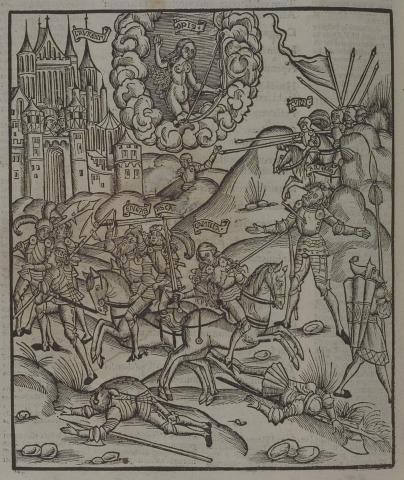CORE VOCABULARY
Cybelē, ēs, and Cybēbē, ēs, or ae, f.: 1. Cybele, the principal goddess of Phrygia, corresponding to the “Magna Mater” of the Romans, and often identified with Rhea and Ops, 10.220. 2. A mountain in Phrygia sacred to Cybele, 3.111.
Chlōreus (dissyll.), eī and eos, m.: Chloreus, a Trojan, priest of Cybele, 11.768.
īnsīgnis, e: beautiful, 3.468; splendid, adorned, 4.134; conspicuous, 6.808; marked, renowned, distinguished, 1.10; illustrious, glorious, 10.450. (in and sīgnum)
Phrygius, a, um: Phrygian, Trojan, 1.381; subst., Phrygiae, ārum, f., Phrygian or Trojan women, 518. (Phryx)
fulgeō, fulsī, 2, and fulgō, 3, n.: to shine brightly; flash, gleam, glance, 5.562.
spūmō, āvī, ātus, 1, n. and a.: to foam, 3.534, et al. (spūma)
pellis, is, f.: a skin, hide, 2.722, et al.
aēnus, a, um: adj. (aes), of bronze; brazen, 2.470; subst., aēnum, ī, n., a bronze or brazen vessel; caldron, 1.213, et al.
plūma, ae, f.: the soft under-feather; a soft feather; plume, feather, 3.242; plumage, 11.771.
squāma, ae, f.: a scale of fishes, serpents, etc.; of the small plates or scales of armor, 11.488; singular as a collective, scales, 5.88, et al.
cōnserō, seruī, sertus, 3, a.: to tie together; fasten, 3.594; arm, 11.771; cōnserere proelia, to join battle, engage in, fight, 2.398.
peregrīnus, a, um: adj. (peregre from per and ager), of foreign lands; foreign, barbarian, 11.772.
ferrūgō, inis, f.: iron rust; the color of iron rust; dusky or brown tint, 11.772; red or purple, 9.582. (ferrum)
ostrum, ī, n.: the purple fluid of the murex; purple dye, purple, 5.111; purple cloth, covering or drapery, 1.700; purple decoration, 10.722; purple trappings, housings, 7.277.
spīculum, ī, n.: a sharp point; (meton.), an arrow, a dart, javelin, spear, 5.307.
torqueō, torsī, tortus, 2, a.: to wind, turn, twist, 4.575; roll along, 6.551; whirl, hurl, 3.208; shoot, 5.497; cast, dash, 1.108; direct, 4.220; turn away, 6.547; turn, cause to revolve, 4.269; control, 12.180; p., tortus, a, um, whirled, whirling, impetuous, 7.567.
Lycius, a, um: adj. (Lycia), Lycian, 6.334, et al.; pl., Lyciī, ōrum, m., the Lycians, 1.113.
Gortȳnius, a, um: (adj.), of Gortyna, a town in Crete; Gortynian, Cretan.
umerus, ī, m.: the upper bone of the arm; the shoulder, 1.501, and freq.
arcus, ūs, m.: a bow, 5.500, et al.; the rainbow, 5.88.
cassida, ae, and cassis, idis, f.: a helmet (of metal), 11.775.
croceus, a, um: adj. (crocus), of saffron; saffron-colored, yellow, 4.585.
chlamys, ydis, f.: a mantle or cloak of woolen cloth, worn by the Greeks; a mantle, 3.484.
crepō, uī, itus, 1, n. and a.: to rattle; creak, crack, 5.206; rustle, 11.775.
carbaseus, a, um: adj. (carbasus), of linen, linen-, 11.776.
fulvus, a, um: (adj.), reddish or tawny yellow; yellow, 5.374; tawny, 2.722; brown, 11.751; glowing, bright, 12.792.
nōdus, ī, m.: a knot, 1.320, et al.; of a tree, 11.553; bond, 1.296; coil, 2.220; (fig.), difficult point; center of strife, 10.428.
pingō, pīnxī, pīctus, 3, a.: to paint, 5.663; color, stain, dye, 7.252; tattoo, 4.146.
acus, ūs, f.: a needle, 9.582. (acuō)
tunica, ae, f.: the under-garment of men and women; vest, tunic, 9.616; cuirass, corselet, 10.314.
barbarus, a, um: (adj.), barbarian, savage, 1.539; foreign, barbaric, 11.777; subst., barbarus, ī, m., a barbarian, mercenary stranger, or soldier.
tegmen (tegumen), inis, n.: a means of covering; skin, hide, 1.275; clothing, 3.594; shield, 9.577; tegmen crūrum, close-fitting trousers worn by Phrygians, 11.777. (tegō)
crūs, crūris, n.: the leg, especially from the knee to the ankle.
sīve or seu: (conj.), or if, freq.; or, 5.69; elliptical, 11.327; sīve (seu) — sīve (seu), whether — or, 1.569, 570; either — or, 4.240, 241.
praefīgō, fīxī, fīxus, 3, a.: to fasten before, in front of, w. acc. and dat., 11.778; on the end, 9.466; to tip, head, point, 5.557.
Trōius, a, um: (adj.), of Troy, Trojan, 1.119.
captīvus, a, um: adj. (capiō), taken in war; captured, captive, 2.765; of a captive or of captives, 10.520; subst., captīvus, ī, m., a captive, 9.273.
vēnātrīx, īcis, f.: a huntress, 1.319; adj., 11.780. (vēnor)
certāmen, inis, n.: a striving, a struggle; effort, 5.197; combat, emulation, strife, 3.128; battle, war, 8.639; contest, game, 5.286. (certō)
incautus, a, um: (adj.), unguarded, heedless, 10.386; unsuspecting, 1.350.
fēmineus, a, um: adj. (fēmina), pertaining to women; female, 9.142; a woman’s, of a woman, 2.584; of women, 4.667; fit for a woman, 12.53.
spolium, I, n.: that which is taken from the body of a slain man or beast; spoil, trophy, 1.289; spolia opīma, the arms or spoils taken by a victorious general from the body of a hostile commander slain in battle, 6.855.
īnsidiae, ārum, f.: a sitting down, or lying in ambuscade; an ambush, 11.783; snare, toil; plot, treachery, wile, 2.36; stealthy journey or enterprise, 9.237; artifice, stratagem, 2.421; personif. pl., Īnsidiae, ārum, Stratagem, 12.336. (īnsideō)
tempus, oris, n.: 1. Time in general, a period, time, 1.278; interval or space of time, 4.433; crisis, circumstance, juncture, 7.37; season, fitting time, opportunity, proper moment, 4.294; ex longō (tempore), in or for a long time, 9.64. 2. The temple of the forehead, 9.418; commonly pl., 2.684; of animals, 12.173.
concitō, āvī, ātus, 1, intens. a.: to move with force; hurl, 11.784; spur, 11.742; (with sē), to speed, fly, 7.476.
Arrūns, untis, m.: Arruns or Aruns, an Etruscan follower of Tarchon, 11.759.
Sōracte, is, n.: Soracte, in Etruria, northeast of Rome, on which in ancient times was a temple of Apollo, 7.696.
Apollō, inis, m.: Apollo, son of Jupiter and Latona; the god of prophecy, medicine, music, poetry, and archery, 2.430; met., a temple of Apollo, 3.275.
pīneus, a, um: adj. (pīnus), of pine, made of pine, produced from pine, piny, 11.786; pine-, 2.258; piny, pine-growing, 11.320.
ārdor, ōris, m.: a burning; fire, flame, 11.786; heat, drought; ardor, zeal, fervor, 4.581. (ārdeō)
acervus, ī, m.: a heap, pile, 4.402.
pāscō, pāvī, pāstus, 3, a. and n.: to furnish with food; to feed; rear, breed, 6.655; nourish, 1.608; (fig.), 1.464; let grow, 7.391; cherish, indulge, nourish, 10.627; pass. as dep., pāscor, pāstus sum, 3, a. and n., to graze, 1.186; feed upon, eat, 2.471; use for pasture, to pasture, 11.319.
frētus, a, um: (adj.), leaning on; w. abl. of the thing on which; relying on, confiding in, trusting to, 4.245.
cultor, ōris, m.: a husbandman, cultivator; inhabitant; worshiper, 11.788. (colō)
prūna, ae, f.: a live coal, 5.103.
aboleō, ēvī, itus, 2, a.: to cause to wane or waste; to destroy, 4.497; cleanse, efface, wipe out, 11.789; obliterate the memory of, 1.720.
dēdecus, oris, n.: dishonor, disgrace, shame, 10.681.
omnipotēns, entis: adj. (omnis and potēns), all-powerful, almighty, 1.60; supreme, sovereign, 10.1; subst., The Almighty, 4.220.
exuviae, ārum, f.: that which has been taken off; a garment, vestment, 4.496; armor, arms; spoils, 2.275; memorials, relics, 4.651; skin, 2.473; hide, 11.577. (exuō)
tropaeum, ī, n.: a memorial of the turning (cf. τρέπειν, to turn) or rout of an enemy; the trunk of a tree on which were hung the arms or spoils of an enemy slain; any memento of victory; a trophy.
dīrus, a, um: (adj.), accursed; portentous; fearful, dreadful, awful, dire, cruel, horrible, freq.; accursed, 2.261; unhallowed, impious, 6.373; foul, carrion, 3.262; wild, furious, ardent, 9.185; pl., dīra (adv.), fearfully, 10.572.
pestis, is, f.: destruction, 5.699; plague, pest, scourge, 3.215; death, 9.328; infection, pollution, 6.737; fatal, baneful passion, 1.712. (perdō)
patrius, a, um: adj. (pater), pertaining to one's father or ancestors; a father's, 2.658; paternal, natural to a father, 1.643; exacted by a father, 7.766; due to, felt for a father or parent, 9.294; ancestral, hereditary, 3.249; of one's country, native, 3.281; belonging to the nation, of the country, 11.374.
remeō, āvī, ātus, 1, a. and n.: to go back, return, 2.95.
inglōrius, a, um: (adj.), without glory; unrenowned, inglorious, 10.52.


